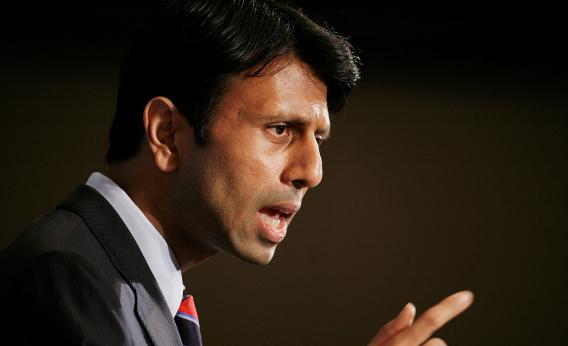Judging by today’s Jonathan Martin piece, I’d say Bobby Jindal has the inside track to win a Republican Party primary. That’s because he’s hit the ideological sweet spot of calling for new economic policies without actually calling for any new policies.
Jindal doesn’t want Republicans to change their stance on immigration policy and, in fact, phrases his rejection of a new immigration policy in a manner well-calculated to appeal to white identity politics:
Jindal, the son of Indian immigrants, said the GOP “must reject identity politics” and “treat folks as individuals, as Americans, not as members of special interest groups.”
Nor will Republicans change their stance on social issues:
On cultural issues, he suggested the party not retreat from its stances opposing abortion rights and gay marriage but rather soften its tone on such matters.
Instead, Jindal’s pitch is that the GOP needs a bold new economic message. But when I asked Martin where he thought Jindal’s policy ideas were he pointed to this:
Even more notably, Jindal suggested he’d look favorably on something akin to the “Volcker rule.”
“You’ve seen some conservatives come around to the idea that if banks are going to be using FDIC-insured deposits, they shouldn’t be allowed to co-mingle those funds with some of their riskier investment banking activity,” Jindal said. “There needs to be stronger walls between insured deposits, the taxpayer protected side of business and riskier side of business that generate these risks and profits.”
That’s not what the Volcker Rule is. The idea of the Volcker Rule is that insured institutions should be actually prevented from engaging in speculative proprietary trading. Jindal’s idea is simply that insured deposits should not be invested in a risky manner. That’s a restatement of previous FDIC policy, not a new idea.
And again on education, Jindal’s big idea is to simply reiterate longstanding conservative support for vouchers:
To Jindal, that means improving the quality of education for kids across class and racial lines. The author of a major school reform bill this year, he said education is one example of how government needs to be changed to adapt to the times.
“Let the dollar follow the child instead of making the child follow the dollar,” he said of his policies to support charter, private and home schooling.
This is, I think, probably a winning primary platform. Republicans would like to win more elections but don’t want to change their policies, so they’re eager for a candidate who has “new ideas” but no new ideas.
